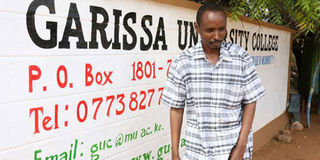Guard shot in college terror attack paying own medical bill

Garissa University Collage security guard Ibrahim Maalim narrates how terrorist shot him during the attacks. PHOTO | JEFF ANGOTE | NATION MEDIA GROUP
What you need to know:
- Walking with a distinct limp and squinting at the unforgiving, sweltering Garissa sun, Mr Kassim is a bitter man. He is angry with a government that has disappointed him and is tired of promises that have never materialised.
- Although he has been receiving his usual monthly salary, it is barely enough to cover his medical and life expenses. With his meagre salary, he can only afford to go to a local clinic — Medina clinic — and his leg has not been showing much sign of getting better.
A year after the Garissa University College terrorist attack, Mr Ibrahim Maalim Kassim, the guard who took a bullet to the leg, has not yet gone back to work.
Mr Kassim was working the night shift on the eve of April 2, 2015 when the four terrorists entered the university through the gate and shot him as he tried to escape.
Efforts to access proper medical care have proved fruitless for Mr Kassim, who has no money to foot the medical bills piling up on him.
Walking with a distinct limp and squinting at the unforgiving, sweltering Garissa sun, Mr Kassim is a bitter man. He is angry with a government that has disappointed him and is tired of promises that have never materialised.
“I went to the Kenyatta National Hospital but I was turned away because they said they cannot attend to me as the university does not have a credit account with the referral hospital,” he says.
Mr Kassim has somewhat become a local celebrity thanks to the numerous television interviews and stories written about him. His face is easily recognisable wherever he goes, as the man who was in the first line of defence against the terrorists who attacked the university. However, his fame lacks its proverbial cousin, fortune. Mr Kassim feels he is just another local popular guy with a big name and bigger problems.
“I am in pain,” he says, pointing to the gunshot wound on his right leg, “My nerves hurt especially at night in the cold.”
Although he has been receiving his usual monthly salary, it is barely enough to cover his medical and life expenses. With his meagre salary, he can only afford to go to a local clinic — Medina clinic — and his leg has not been showing much sign of getting better.
It is a difficult interview for him, this one. He is forced to relive a trauma that he has not yet come to terms with.
“When I heard the gunshots, I slept on the ground, flat, and did not see anything. It was so dark. I was very afraid afterwards, but a lot of prayer has helped me get through the trauma,” he says.
After the attack, he stayed at the Garissa General Hospital for 11 days before being discharged. He thought his problems would be over as soon as the gunshot wound was healed. He was wrong.
“I am in need of regular physiotherapy and I am still taking medication for the pain,” he says.
Mr Kassim is disturbed by the fact that these days, he has nothing much to look forward to. His stinging, lingering pain from his foot has reduced him to sitting at home all day, except for his morning and evening walks. His leg has not only paralysed his work life, but also his personal life.
At 31 years, Mr Kassim is not married and has no children. As his peers welcome one baby after the other, Kassim remains a prisoner of a tragedy, which everyone seems to have moved on, except him.
He would like to find a nice girl and marry someday, but his medical bills are leaving him no money to feed an extra mouth.
“When I wake up, I pray. Then I take a walk to exercise my leg. When I get tired, I go back home and sleep until 5pm then I wake up and go out for another walk. That is my typical day,” he says.
Mr Kassim believes that if he could just access the specialists at Kijabe District Hospital, then he could get better and return to his job of guarding the students at Garissa University College.
“I don’t want money to buy food. I am not asking for money to buy clothes. I just want my health back. My health is the most important thing to me right now so that I can be able to work again,” he says.





